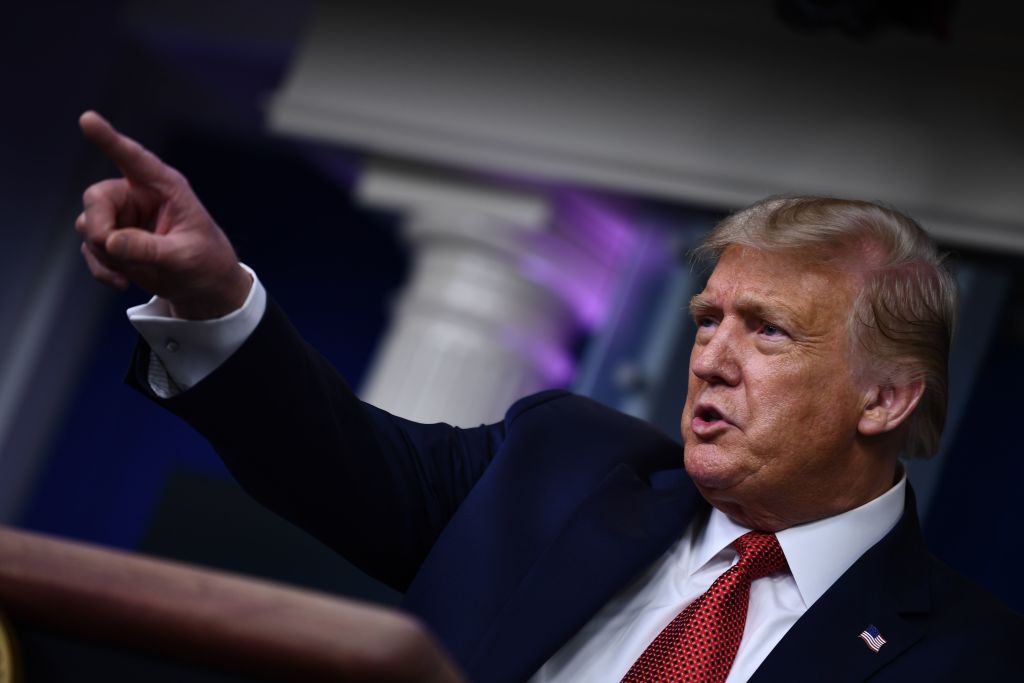It is alarming how psychiatric diagnoses have crept into the political commentary. Donald Trump, we’ve been told, has narcissistic personality disorder, malignant narcissism, narcissistic alexithymia, bipolar disorder, hypomanic temperament, delusional disorder, paranoia, senile dementia, extreme hedonism, histrionic personality disorder, impulse disorder, attention deficit/ hyperactivity disorder (ADHD) and dyslexia. He’s also been called a sociopath and psychopath. Even normality has, in Trump’s hands, been transmogrified — pathologized — as ‘malignant normality’.
Many psychiatric professionals have attempted to make such diagnoses, but they are wrong. President Trump does not demonstrate any diagnosable mental illness. The very author of the section on narcissistic personality disorder in Diagnostic and Statistical Manual of Mental Disorders (DSM), Allen Frances, has himself refuted the suggestion that Trump is suffering from it. ‘Trump doesn’t meet DSM criteria [for any mental disorder],’ the professor says. ‘I wrote the criteria and should know how they are meant to be applied. Personality disorder requires the presence of clinically significant distress and/or impairment.’
Furthermore, in January 2017 the results of Trump’s annual medical exam found him physically healthy, not cognitively impaired, and made no recommendations for a psychiatric consultation. After examination by 11 medical specialists, a similar clean bill of health was delivered in 2019. The only bad point in his health report was his weight, which puts him over the obesity threshold.
For many decades the American Psychiatric Association has required that persons diagnosed as mentally ill have two essential characteristics: significant disturbances of emotion, belief or behavior, and resultant significant distress or impairment. Trump’s mental state is no different from how it was during his five decades as a businessman. Trump was ridiculed for providing his own personality assessment, in which he described himself as a ‘very stable genius’. But, leaving aside the ‘genius’ bit, he is right: his personality traits have been remarkably stable over time. It is understandable that his policies and behavior may not be to one’s liking or political persuasion, but they do not reflect mental illness.
Psychiatric articles that try to identify mental illness are marked by lists of early signs of disorder, including social withdrawal, mood disturbances, failure at work, domestic disruptions, sleep disorders, sharp increases or decreases in energy level, strange new behaviors, personal appearance, drug addiction or alcoholism, and cognitive decline and eating disorders. Trump shows none of these warning signs of mental illness. He does, by contrast, fit the definition of mental health used by the World Health Organization (WHO): ‘A state of well-being in which the individual (1) realizes his or her own abilities, can cope with the normal stresses of life, can work productively and fruitfully, and (2) is able to make a contribution to his or her community.’
One aspect of Trump’s general health that deserves special notice is his constitutional stamina, a quality desirable in a president. Throughout his adult life Trump has never required more than four to five hours’ sleep a night, and he remains highly active and alert during waking hours. Corey Lewandowski, in his account of the presidential campaign, reports that daytime sleeping was almost entirely absent from the candidate’s regimen: in more than 1,000 flight hours, he’d seen Trump take a 30-minute nap on only a handful of occasions. I have noticed the total lack of any medical report, either during the campaign or in all the time post-election and through the White House presidency, in which Donald Trump was reported ill — even having the sniffles or needing a day off to rest. Trump’s frequent golf outings usually go 18 holes, and are played vigorously and competitively. Also noteworthy is Trump’s lifelong total abstinence from alcohol, smoking and drugs. No other American president matches this triad of lifetime health habits. Trump’s only vice, if it can be called that, is drinking 12 Diet Cokes a day.
Trump’s sanity stands in contrast to many past presidents. A 2006 study of 37 American presidents from 1776 to 1974 by Jonathan Davidson of Duke University Medical Center in North Carolina found that nearly 50 percent qualified for having at least some form of mental illness, and yet performed remarkably well in their presidential roles. For example, James Madison and Abraham Lincoln suffered from depression; Theodore Roosevelt and Lyndon B. Johnson were deemed bipolar; Ulysses Grant and Richard Nixon suffered with alcoholism; and Ronald Reagan from dementia.
The use of psychiatric diagnoses as a political tool is reminiscent of post-Stalin Soviet Russia. After Stalin, political murder was replaced by the psychiatric ‘hospitalization’ of political opponents. Massive bouts of electroconvulsive therapy and mind-numbing doses of psychotropic drugs were administered in prison-like psychiatric hospital conditions that reduced people to veritable zombies.
***
A print and digital subscription to The Spectator is just $7.99 a month
***
In 1991, after the fall of the Soviet Union and during Russia’s period of perestroika (rebuilding), I was part of an American group of psychiatrists invited to Russia to teach psychodynamic and psychoanalytic therapy — ‘talking therapy’, which gives voice to taboo thoughts. These concepts and writings were illegal under the Soviets, punishable by time in the gulag. During repeated visits to Russia I continued to hear sad stories of the abusive use of psychiatry to squelch opposition in the former Soviet Union. Common in these painful remembrances were the misuse of psychotropic medications to drug the victims, disabling their mental abilities, and the application of electroconvulsive therapy to obliterate memory and feelings.
This misuse of psychiatric diagnoses is not restricted to the former Soviet Union, either. The New England Journal of Medicine recently reviewed the history of ‘medicalization and demedicalization’ of diagnoses. Among them, the article recorded how homosexuality was once wrongly classified as a mental illness — something which was neither challenged nor publicly debated for many decades.
The current upsurge in political psychiatric shaming poses a threat to our democratic system, which properly relies on political rhetoric and votes to express opposition. Opponents of Trump should stop trying to play psychiatrist and stick to political issues. He is not mentally unfit for office, however good or bad the arguments against his policies.
This is an edited excerpt from Psychologically Sound: The Mind of Donald J. Trump by Sheldon Roth MD, published by Post Hill Press. This article is in The Spectator’s August 2020 US edition.

























